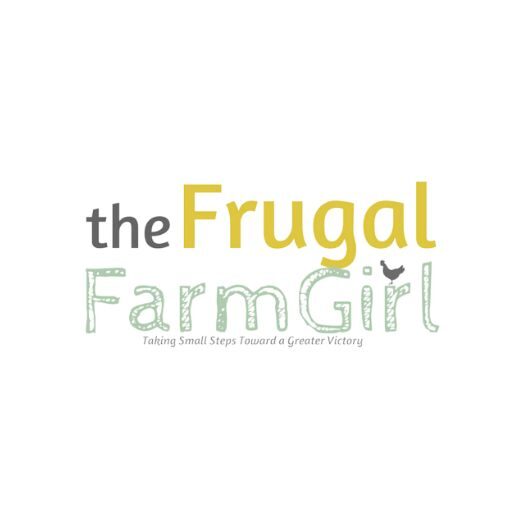Pickling is one of the oldest forms of food preservation, and it can be a great way to extend the shelf life of your fruits and vegetables. When done correctly, pickling can help to prevent harmful bacteria from growing and spoiling your food.
Additionally, pickling can add an extra layer of flavor to your dishes. Pickling may be the right choice for you if you’re looking for a way to preserve your food and add some extra flavor.
Pickling is one of my favorite ways to store my cucumbers and pickles; this dilly beans is a great recipe.
Let’s get into all the benefits and tips for pickling your produce for winter.

Benefits of Brine Pickling
Fermented foods are a great way to improve your gut bacteria, which impacts anything from how you feel after eating them all day or if there are any standing stomach issues.
With brine pickling being one for fermentation, it allows beneficial flora in the form of car-borne sugary acids that can crowd out bad actors trying to take over.
At the same time, they’re already present – effectively preserving these goods at their peak healthiness!
Cheese also goes through similar processes where its proteins break down into amino acids, making spaces available so enzymes may work more efficiently, resulting in a more flavorful end product.
The benefits of pickling vegetables are vast, so if you have yet to try them, now is the time! Not only will your gut will thank you, but your taste buds definitely will too.
- It’s a great way to preserve fruits and vegetables.
- It can help to prevent harmful bacteria from growing and spoiling your food.
- It can add an extra layer of flavor to your dishes.
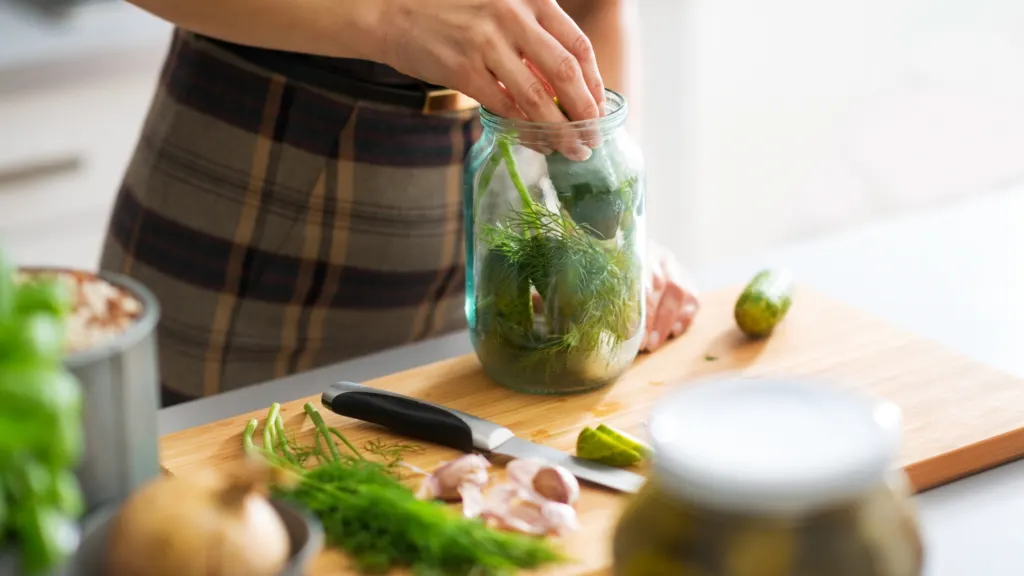
Advantages of Pickling Food
1. Increased shelf life
Pickling can help to extend the shelf life of your food. In addition, when done correctly, pickling can prevent harmful bacteria from growing and spoiling your food.
2. Added flavor
In addition to extending your food’s shelf life, pickling can add an extra layer of flavor to your dishes.
3. Improved gut health
Fermented foods, like pickled vegetables, are a great way to improve your gut bacteria. The benefits of pickling vegetables can help to improve your overall health.
4. Easy to do
Pickling is relatively easy to do and does not require any special equipment. All you need is a jar, some vinegar, and your desired fruits or vegetables.
5. Inexpensive
Pickling is an inexpensive way to preserve your food. All you need is a jar, some vinegar, and your desired fruits or vegetables.
Examples of Brine Pickling Foods
Kosher pickles are the perfect example of cucumbers being preserved in a vinegar and water mixture. The cucumbers are soaked in the pickling solution for several days, allowing them to absorb the flavor of the vinegar and spices.
When planting vegetables in your garden, always add a variety of cucumbers, including the best ones for pickling. Pickled cucumbers are a family favorite in our home.
Another example of brine pickling is sauerkraut. Sauerkraut is made by fermenting cabbage in a salt and water solution.
The fermentation process creates lactic acid, which helps to preserve the cabbage and gives it its distinctive sour flavor.
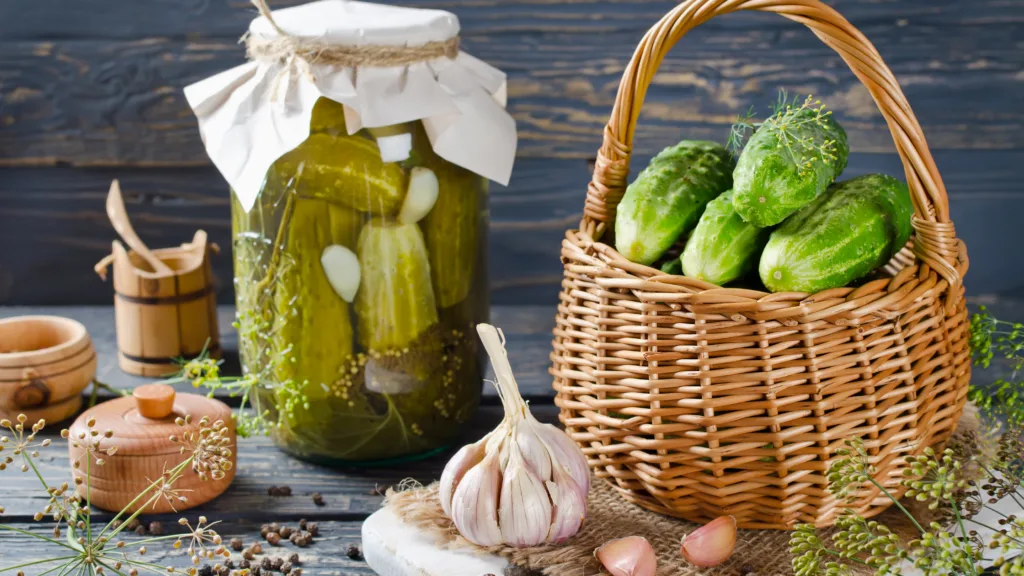
Disadvantages to pickling food
Some nutrients are lost
Water-soluble vitamins like vitamin C and some B vitamins may be leached out into the pickling solution.
The food may become mushy
They may become mushy if you pickle fruits or vegetables for too long.
The flavor of the food may change
If you pickle fruits or vegetables for too long, they may absorb too much vinegar and become too sour.
The food may become unsafe to eat
If you do not correctly sterilize your jars and lids, your pickled foods may become contaminated with bacteria.
You may not like the taste of pickled foods
Some people do not like the taste of pickled foods. If you have never tried pickled foods, you may want to start with a small batch to see if you like them.
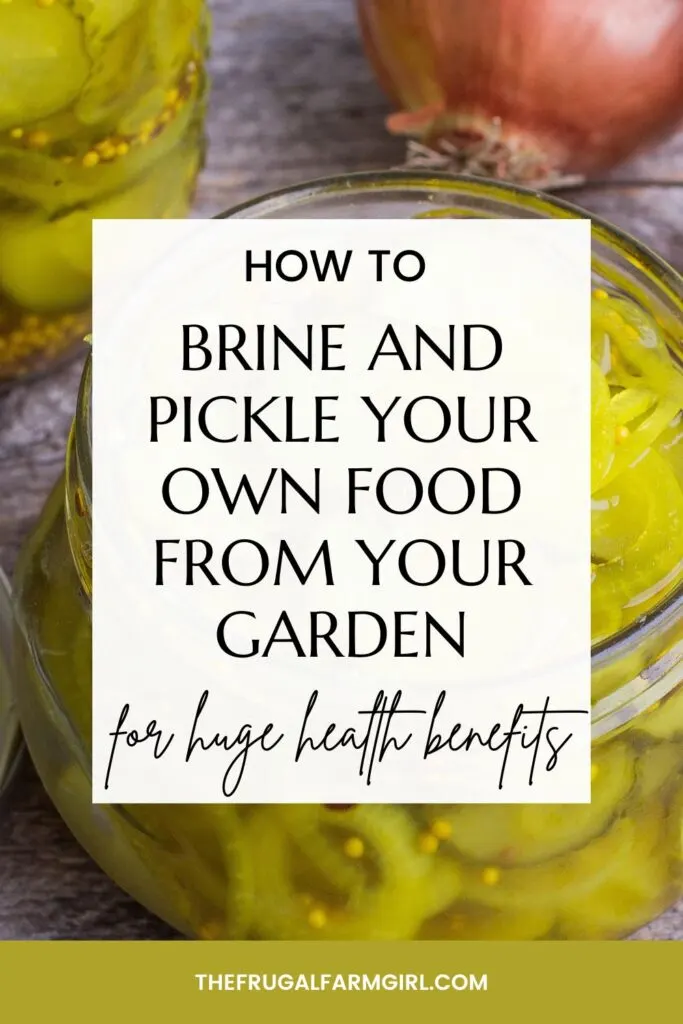
More Health Benefits to Fermented Foods
Boosts Immunity
The lactic acid produced during fermentation can help to kill harmful bacteria and boost immunity.
Aids in Digestion
Fermented foods can help to improve digestion by aiding in the breakdown of food.
Helps with Weight Loss
The probiotics in fermented foods can help to promote weight loss by helping to reduce appetite and increase metabolism.
Reduces Inflammation
Fermented foods’ anti-inflammatory properties can help reduce inflammation throughout the body.
Improves Heart Health:
The probiotics in fermented foods can help to improve heart health by reducing cholesterol and blood pressure.
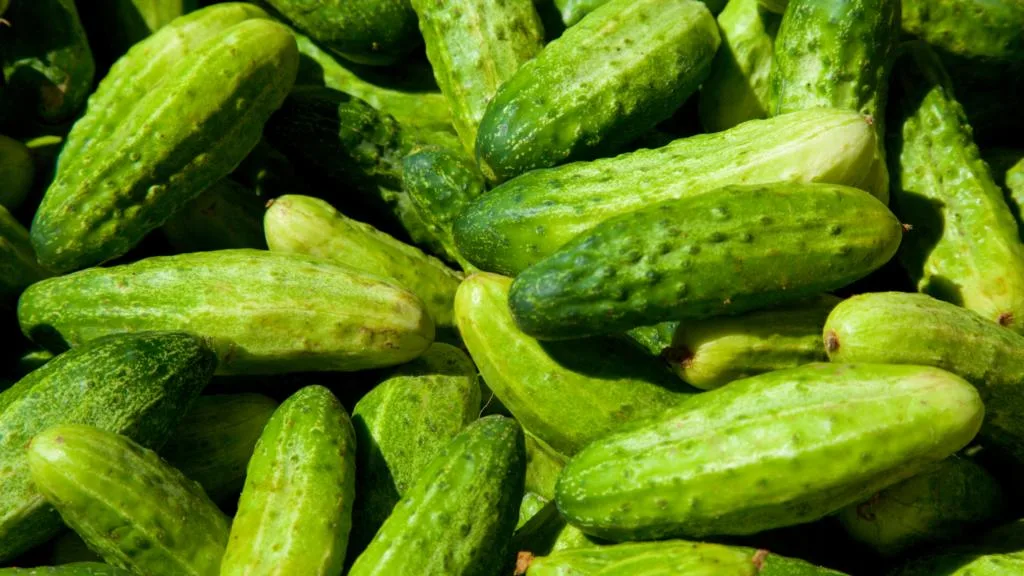
Health Benefits of Pickles
- Pickles are a good source of antioxidants.
- Pickles can help to improve gut health.
- Pickles may help to lower blood sugar levels.
- Pickles may help to protect against certain types of cancer.
- Pickles may help to protect against certain types of cancer.
How to Make Quick Pickles
I grab the premix packets of pickle mix and my local feed store. It’s quick and easy, and my pickles have always tasted delicious. You can choose dill or sweet pickles.
Below you will see a basic recipe to give you an idea of some of the ingredients you will need on hand to make pickles. I highly recommend making at least one batch of pickles for the taste and health benefits.
Ingredients:
- pound small cucumbers
- 1 small sweet onion
- 1 cup apple cider vinegar
- 1 cup water
- 1/4 cup granulated sugar
- 1 tablespoon kosher salt
- 1 clove garlic, peeled and crushed
- a couple of sprigs of dill (optional)
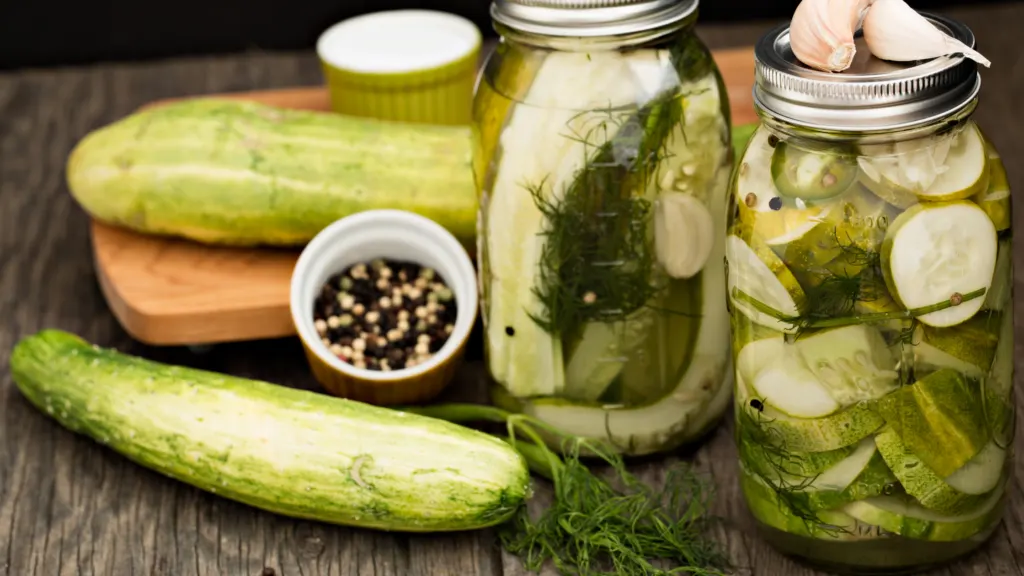
How to Make Fermented Foods/ Pickles
1. Start with clean, fresh produce. Ensure you thoroughly wash your fruits and vegetables before beginning the fermentation process.
2. chop or slice your produce/ pickles into small pieces. This will help to release the natural sugars and allow the fermentation process to begin more quickly.
3. Place your produce in a clean glass jar and add ingredients leaving a 1/2-inch of space at the top.
4. Make your pickling solution by combing the ingredients from your recipe or using the abovementioned ingredients by cooking in a small saucepan.
This will be your delicious pickle juice! Does anyone have kids who drink this straight out of the jar?!
5. Bring your pickling solution to a boil and then simmer for about five minutes. Continue to stir while it’s simmering.
6. Pour your brining solution over the cucumbers in your prepared jars. Don’t forget to leave 1/2 headspace.
7. Place your jars in the fridge. I like to wait at least 24 hours before tasting. The longer the pickles sit, the more flavorful they will be.
Pickling is a great way to preserve your food and add an extra layer of flavor to your dishes. In addition, the benefits of pickling vegetables can help to improve your overall health.
Pickling is relatively easy to do and does not require any special equipment. If you are looking for a delicious and easy way to preserve your cucumbers, look no further than the brine pickling method.
This simple process results in a tasty snack you can enjoy all year round.
However, there are some disadvantages to consider before you get started. First, make sure you have enough storage space for your jars of pickles and be prepared for them to take up quite a bit of room in your refrigerator.
Also, remember that not everyone enjoys pickled cucumbers as much as you do, so make sure to share them with your friends and family!
Have you tried making dill pickles? What tips would you add?
